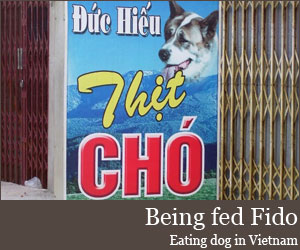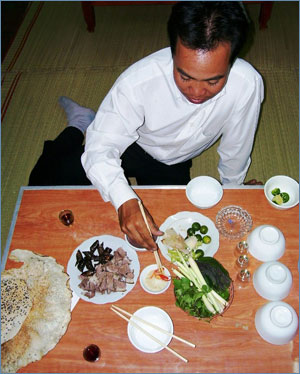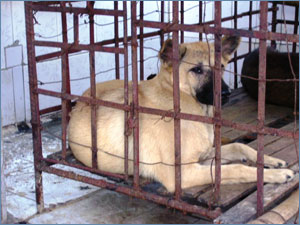Being something of a culinary adventurer, I decided to try dog meat, and brought a Vietnamese guide along with me to share the experience. Afterall, eating dog is so much friendlier with two. Approaching the restaurant, I was in for a bit of a shock: a sign outside advertising Thit Cho, with a blown-up photo of a healthy-looking German shepherd prominently displayed. As if this were somehow appetizing. But then, when you think about it -- back in the US, a jolly cartoon pig on a sign outside a pork barbecue is not unheard-of. This was the same thing, right?
When I entered the courtyard of the restaurant, another shock: a dog happily bopping around among the low tables. Did the dinner get loose? No -- this was the family's pet dog. Okay.
I sat down, cross-legged at one of the tables and glanced to my left where I noticed two live dogs sitting glumly, silently, in a wooden cage. I definitely wasn't expecting to see that. At first I had a thought, rooted in denial, that these could be more pet dogs, that were just sitting in a cage ... for some reason.
But no. They were dinner.



I struggle with myself. Dogs are intelligent and affectionate. That's why we don't eat them. But then, pigs can be intelligent and affectionate as well. People keep pigs as pets. Pot bellied pigs. Vietnamese Pot Bellied pigs make excellent pets, and I eat pork all the time without thinking twice about it. I'm just being an ethnocentric western hypocrite.
I try to put the dogs in the cages out of my mind and get down to the business at hand -- devouring their fallen comrade. Dogs are eaten all over Asia -- Korea, China, Laos parts of Northern Thailand. I'm not going to impose my occidental world-view on what I'm experiencing. If it's a common practice among so many people, there must be something to it.
My 'guide' and I order up a dog feast. Roast dog, barbecued dog, dog stew. Just to cover all the bases. The locals at the other tables watch me out of the side of their eye, punctuated by nudges and chuckles to their friends, trying to gage if I like it. I dig into each offering as it arrives, and assure my Vietnamese audience that I enjoy it thoroughly. Even though that's not entirely true.
It's a strange taste. Not a bad taste. It's hard to explain. People who try lamb for the first time probably have a similar experience. Dog tastes nothing like lamb -- it's just a little different in sort of the same way. And despite numerous jokes to the contrary, it tastes nothing like chicken.
The barbecued dog is the best of the dishes. Cooked up on a charcoal grill, crispy chunks of meat in a sesame-seed marinade -- hard to go wrong with that. The roast dog presents much like roast pork, and has the mildest flavour. It's traditionally eaten with mam tam, which is a singular experience in itself. It's made from raw shrimp paste, and it smells and tastes exactly like raw sewage. I dip each piece of meat in it, if only a little, and struggle to get the point.
The most problematic entree in the dog feast is the dog stew. In an attractive clay pot, simmered in rice-wine, it's exactly like a succulent beef stew that I might otherwise be delighted to enjoy. But it's like eating insect flavoured ice cream. It's hard to enjoy it, even if it tastes good.
I ask my guide where they get the dogs we're eating. "From families with farms," he tells me.
Really? Farms? What kind of farms? Dog farms? The mind races.
No, not really 'dog farms.' Just regular farms, and along with the pigs and chickens, they raise some dogs sometimes, to be sold to dog restaurants.
In for a penny, in for a pound, I ask the question that is always on everyone's mind in relation to eating dog. "If someone's pet dog gets loose, could someone round it up and sell it to a dog restaurant?" After all, that's what we westerners are afraid of. Rover's on the barbecue. That's what makes it seem wrong.
My guide smiles. "We don't kill the dog if we love the dog," he assures me. "If we love the dog, we wait until it dies. Then we sell it to a dog restaurant."
Ah! That makes sense. Rover croaks, and, rather than letting him push up daisies in the backyard, you make 20 bucks off the traumatic event.
Let the healing begin.
I drink some more rice wine, a traditional accompaniment to dog meat in Vietnam. It tastes like lighter fluid, and kicks a punch of about 80 proof. Good thing in this case. It dulls my senses so I can get through the rest of the meal.
As we're leaving the restaurant I notice a place next door advertising meo. The sign out front features a picture of a cat. Something tells me it's not a pet shop. Despite my unnerving foray into dog consumption, I'm curious to give it a try. I'm not much of a cat person anyway. Probably tastes like chicken.